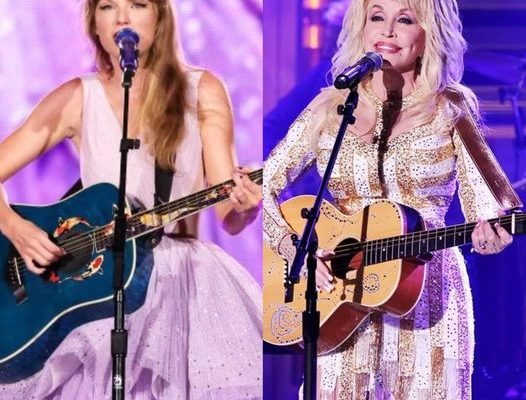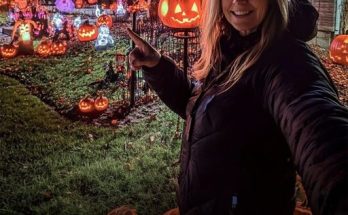Dolly Parton’s favorite word might be “no.”
She turned down Elvis Presley when he wanted to record her hit “I Will Always Love You” after his manager requested half of the song’s publishing rights. She initially declined her invitation to join the Rock and Roll Hall of Fame. And she forwent performing at the Super Bowl halftime show — several times.
Most artists wouldn’t pass on those golden opportunities, but this American treasure is unbothered.

“Oh, sure. I’ve been offered that many times,” Parton tells The Hollywood Reporter about the halftime show. “I couldn’t do it because of other things, or I just didn’t think I was big enough to do it — to do that big of a production. When you think about those shows, those are big, big productions. I’ve never done anything with that big of a production. I don’t know if I could have. I think at the time that’s what I was thinking.”
Related Stories

Now that she’s releasing her first-ever rock ’n’ roll album — Rockstar is out Nov. 17 — she looks at the epic performance slot a little differently: “It would make more sense. That might change. I might be able to do a production show.”
But Parton doesn’t sweat the small things — and with a rich career like hers, those offers can be categorized as minor. She’s won 10 Grammys with 53 nominations — placing her second behind Beyoncé for most nominations by a female artist; she’s a two-time Oscar-nominated songwriter who has written her own hits and those for your favorite performers; she’s logged 25 No. 1 successes on the Billboard Hot Country Songs chart; and she’s saturated all facets of pop culture, from acting and producing to philanthropy and fashion. On this particular day in October, Parton is in a fitted powder blue suit and silver heels that match her silver accessories. She’s beaming with a wide smile, and her hair is big enough to help her reach just over 5 feet.
“Dolly is a force of evolution and transformation in our industry, but she does it with such playful levity it almost looks effortless. Her sense of humor and mischief are easily my favorite things about her, because I think it forces the world to reconcile that a woman can be a serious artist and writer who also has raucous fun with it, can make people laugh and be in on every joke,” Taylor Swift tells THR. “She’s never stopped challenging herself to clear new hurdles and explore new territory artistically, and I think that speaks to her great curiosity about the human condition. She’s a legendary empath and the storyteller for the ages. She’s also having the most fun doing it.”
Parton’s warm energy is infectious, and she is enthusiastic as she discusses the decades she spent working on Rockstar. Her rolodex is loaded, and she’s called on the greats to help her sing rock classics and originals on the 30-song effort, including Paul McCartney, Elton John, Stevie Nicks, Sting, Joan Jett, Kid Rock, Emmylou Harris, Ringo Starr, Steven Tyler, Melissa Etheridge and more. Contemporary acts like Chris Stapleton, Miley Cyrus, Lizzo, Pink and Brandi Carlile also make appearances on the album.
Parton only thought of releasing the project after being inducted into the Rock Hall last year. As a country music performer, she didn’t think she was the right fit for the prestigious music organization, and she declined the offer. “They’re going to put me in the Rock and Roll Hall of Fame and somebody like Meat Loaf or some of these other great artists never even made it? I didn’t want to take away from somebody that has spent their life in that world like I had spent mine in country [music],” she says.
She eventually learned more about who is invited to join the Rock Hall, which now comprises a variety of artists, from rappers (Jay-Z) to pop stars (Janet Jackson); this year’s incoming class includes Willie Nelson, Missy Elliott and George Michael. “They told me all the ways that people’s music has influenced other people around the world … and told me about other people that were in it besides rock. Then I accepted it.
“But I still didn’t feel great about it. I still thought I needed to earn it,” she adds. “That’s why I thought, ‘Well, timing is perfect. There’s a real reason for me to do this rock ’n’ roll album. Here I am a rock star at 77.’”

“Going into a hall of fame can make an artist more popular and can make them more famous, and then there’s that handful of artists that go into a hall of fame that makes the hall of fame bigger, right? That’s Dolly Parton,” Garth Brooks tells THR. “The rest of the 99 percent of us are just trying to get in there so we can say we’re in the hall of fame. The hall of fame is clamoring for these people because that is what makes the hall of fame where everybody wants to be.”
During an interview in Nashville, the singer sipped and spilled tea, discussing topics like taking her life story to Broadway, almost collaborating with Cher and Ed Sheeran, AI recordings, cancel culture and entering her rock star era: “I don’t want it to be half-ass country.”
Did you pick the collaborators by calling close friends, or was it based on the songs you wanted to cover?
I’d recorded these all in my key, just me singing them. When I did “Let It Be,” I thought, “Wow, wouldn’t it be cool for me to get some of these same artists that wrote and recorded these songs to sing with me?” Paul [McCartney], I reached out to him and he said, “Yeah, I’ll be happy to play and sing if you want.”
Then after I recorded with him, I thought, “Wow, Ringo is the only one of the Beatles [that’s alive], the two of them.” Then that was an afterthought, but I’d already recorded the song. I was going to put it out anyway, same with all of them. Some of them said, “This is too high for me.” Bob Seger was having trouble with his voice and so he couldn’t work with me on [“Night Moves”], and I love Chris [Stapleton] and I thought, “Well, I’m going to call Chris and see if he’ll sing with me.” He said, “Dolly, that’s in the wrong key.” He said, “But I’ll do my best. I’ll do some ad-libs and I’ll sing some harmonies. I’ll do whatever.” But he killed it, I thought.
After I did 30 songs, [music producer] Kent [Wells] said, “Well, we got to stop.” Then when we got ready to put it together, I thought, “Wow, I can’t leave none of these off since I’m never going to do another rock ‘n’ roll album again.”
“Long as I Can See the Light” with John Fogerty is one of my favorites …
I thought our voices were beautiful together. We did that and it was so fun. That was one of the highlights of my whole album. We went into the studio, and he said, “Let’s just record like we used to in the old days.” It’s got a love in it, don’t it? It’s got a magic in it.
How do you deal when there are times you can’t see the light?
Well, I try to show them. I try to shine with it and let them see it through me. I try to find the God-light in everybody and everybody shines. I see that in everybody. I go right to that God-light, and I don’t care if you’re Black or white or green or alien gray. I go to that, because we’re all pieces of God and we all have that little God-light inside us. Some don’t get to let it shine. If I don’t see it first out, I’d go searching. That’s how I accept everybody because I know that we’re all pieces of God.
Was that instilled in you from your parents? How did you develop that?
Well, a lot of that is my personality, but I did grow up in the church, but sometimes that church can even go against you. Because I also grew up in a church where they criticized and condemned and so many things were a sin. But in my own self, knowing how different I was, knowing that I was criticized for just looking the way I did, they thought I was trash, they thought I was a whore, that I was going to hell in a handbasket just for being young and dressing the way I did and being the way that I was.
I knew how innocent I was in being myself and how pure that was in me. So I try to look for that innocence and that purity in everybody else. Just like my song [“Be That”], “Whatever you are, be that. Whatever you do, do that. Anything else is just an act.” Just like I did a song with Kid Rock on this album. Of course I did that before the controversy that he had, but somebody was talking to me the other day, “How could you do this [song] with Kid?” I said, “Hey, just because I love you don’t mean I don’t love Kid Rock. Just because I love Kid Rock don’t mean I don’t love you.” I don’t condemn or criticize. I just accept and love.
The response to that collaboration was strong…
Like I said, I had done that before, but I’d have probably still done it, because he is a gifted guy, and that song was about a bad boy; it was about a boy that was cheating and mistreating her. But like I say, I love everybody. I don’t criticize, I don’t condone nor condemn. I just accept them. But anyhow, just because I love you don’t mean I don’t love Kid Rock in that God way.
What are your thoughts on cancel culture?
I think that’s terrible. We all make mistakes. We don’t all get caught at it. But also when somebody makes a mistake, it depends on who they are. That’s what God is there for. Now, I happen to believe in God; I’m a faith-based person, so therefore I am able to see it like that. A lot of people don’t, but even still, everybody deserves a second chance. You deserve to be innocent until you’re proven guilty. Even when you’re proven guilty, if God can forgive you, so can I. If God can forgive you, we all should forgive one another.
Was there anyone you wanted on the album but it didn’t work out?
Lionel Richie was supposed to sing with me on one of the songs. I love Lionel, and we’ve been friends for years, and he’d already agreed to do it, but he was really busy.
Cher, same thing. She’s not rock, but we have a very similar gay following. I knew that I could do something with Cher that would be a cool thing for my gay fans. But I love Cher. We’ve been friends for years, so she had agreed to do it, and we were looking for the right song, and then we ran out of time.
Mick Jagger was someone you almost recorded with?
Oh, I wanted him so bad. They were [doing their own album]. I did “(I Can’t Get No) Satisfaction,” but again, it was in the wrong key. He said, “Let’s find another song,” because he was going to do it with me or do something. I was working on stuff, and then we came up with a few things, but then I ran out of time and he was in the middle [of recording] and he was doing that secretly, that album. We were in the same place at the same time, but I didn’t get him.

Is there anyone else you really want to work with?
I would love to sing something with Ed Sheeran. I think our voices would be so beautiful together. Same thing — when I was doing the album, he was working on his own album and had agreed to sing something with me, but we ran out of time. If we did some beautiful love ballad, I think it would be incredible. The fact that he writes it and can play it — yeah, he’s amazing.
I’d love to do a whole album with Chris Stapleton. All those songs that we could kill it with. I love him.
What was it like recording with Stevie Nicks? Did you trade stories about being female performers in the industry?
Well, we did swap stories. She stayed in Nashville for four days, which was great. Getting in the studio with her was great. We talked a lot. She stayed over with Sheryl Crow; they’re friends. She would come in down the studio, and we did get a chance to talk about the business; some are personal stories and stuff that I won’t tell here.
We talked about before she started with Fleetwood Mac. We did talk about the business. We talked about our backgrounds. In fact, our song, “What Has Rock and Roll Ever Done to Me,” she said, “This a song I wrote back when we were in the heat of our stuff.” She said, “It’s a song I love but they didn’t think it was good enough to be on a record.” She said, “I have an old demo of it. Can we do this one, because I wrote it about someone I was involved with that was also in the rock ’n’ roll field when we had an affair?” She wrote that about their relationship because they had fun about it. “What has rock ’n’ roll ever done for you?” They said, “Well, everything,” because they were both famous and rich. She just said, “I just love this song. I’d like to do it just to commemorate that time in my life and that person.” We talked about stuff like that.
You also recorded with Linda Perry, who has spoken openly about the challenges female music producers face. You produce your own music — were there times when people didn’t take you seriously or questioned your abilities?
You always run across that, usually if somebody thinks they’re the ones that they know more than you do. But I’ve co-produced a lot. No matter what I’m involved in, I have ideas. I just throw them in, but like with Kent, he produced this whole thing, but on vocals and stuff, certain things I would do, he would always be amazed with stuff I’d come up with. Then oftentimes he would help me put that in the right place on this rock album.
We’ve seen the number of female songwriters grow, but the number of female producers is so low …
A lot of that’s the girls’ fault. Sometimes they don’t push it. They don’t push themselves. They don’t just step right up and say, “Well, hey, now,” especially if it’s an artist that’s got the power to say, “I’m going to be involved in this, even if I’m co-producing or whatever,” maybe. But I think sometimes you have to kind of step up and make them believe that you can do it.
But I know back in the day, I’ve been involved with a lot of stuff that I was heavily producing, but I knew it was going to be a fester or a sore to the other person who was going to be doing it, so I just started taking executive credit.
Executive producer credit?
Executive producer.
And these are your own albums?
On anything that I do. In TV, an executive producer is different than an executive producer on records; you really are totally hands-on if you’re executive producer in a movie or a TV show. But I said to a musician one time, “What is an executive producer?” He said, “That’s somebody that gets credit for not doing a damn thing.” I thought, “Whoo. Well, I don’t know if I want that credit,” but in my own mind, I knew better.
But sometimes people think that that’s so, but that’s not always so. Sometimes it is, if somebody’s got some money in a project and they get an executive producer credit because they’ve invested. They’ve financed it. But not when it’s creative people.
In music sometimes, I’ve seen some managers get executive producer credit…
That’s what I’m saying. I see that a lot, but that is not so in my case. I’m all over it. I usually come up with the ideas. I pick the songs. I write them. I sing them. I’m the one that has the whole picture of the whole thing. Then I hire somebody; whoever I hire to help produce it or to produce it. I earned my executive producing credit. I earned the title.



